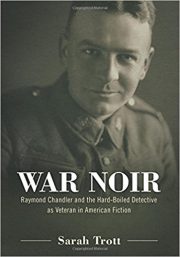Highly respected and valued by many fans of crime fiction and most likely America’s most distinguished crime writer ever, Raymond Chandler (1888-1959) together with Dashiell Hammett invented a new type of tough detective, independently of each other, they founded a style that later was described as “hard-boiled.”
 Many of their novels were turned into successful crime and detective movies in the 1940s and 1950s, and became masterpieces of film noir. While the type of cynical, distrusting detective seemed to have emerged from those movies, the character actually was invented in books, most prominently in Chandler’s seven novels centering around private detective Philip Marlowe.
Many of their novels were turned into successful crime and detective movies in the 1940s and 1950s, and became masterpieces of film noir. While the type of cynical, distrusting detective seemed to have emerged from those movies, the character actually was invented in books, most prominently in Chandler’s seven novels centering around private detective Philip Marlowe.
While there already are some thorough studies on Chandler around and many aspects of his novels and essays have been examined very thoroughly, Trott sees her own study as covering a particular aspect of the writer‘s life and work that has been underrepresented so far. Specifically the experience of American soldiers in France during WWI that forged Chandler’s personality and later had a huge influence upon his prose style and can chiefly be identified in his most famous character, private investigator Marlowe; namely in the way he thinks, talks and acts.
Trott sees numerous traces, influences, and behavior patterns strongly related to incidents that happened to Chandler during the war (when from 1917 to 1919 he volunteered for the Canadian Army) and finally led to what today is known as “hard-boiled style” of writing: a mostly cynical, straightforward, harsh, bitter and absolutely not politically correct way of describing the world and commenting on life. Thus leading to actions (of Chandler’s character Marlowe) that seem unusual for non-veterans and people who ever encountered massive danger and tension for months in a row.
Hence Trott argues that her “…aim with the research conducted for this book is to emphasize that by aggregating all those ‘small signs,’ [in the seven Marlowe novels] the theory that Chandler created Marlowe as a war-troubled veteran of the Great War started to become a real possibility. When examined collectively what becomes visible are the broader symptoms of traumatic wounding.” This is all the more interesting since Chandler not once let Marlowe remember any specific war action or service at all; Marlowe, it seems, rather “inherited” trauma and signs of PTSD (post traumatic stress disorder) from Chandler, who may never have realized this fact.
Trott devotes seven chapters to this theory and approaches topics such as the detective as veteran, Chandler’s very own war memory and its “official version” as related to documents and biographies, the impact of earlier American war writers on him, the Marlowe novels (and images of chivalric and knightly actions), a detailed analysis of links to combat and war trauma in “The Long Goodbye,” and an evaluation of Chandler’s legacy.
After all, this approach is really interesting and lets Chandler’s Marlowe appear in a new light. Nevertheless, Chandler is the only genre writer who had WWI combat experience, and Trott insists that in order to “… understand the detective’s [Marlowe’s] distinctive behavior Candler’s work needs to be viewed in a specific traumatic context. Marlowe was created as a flawed individual tormented by his war experience and suffering the effects of PTSD. … Chandler created his detective in his own image…”
The book also connects the hard-boiled style directly to the experience of American troops fighting in all the wars of the 20 Century, that is on American servicemen of WWI, WWII, Korea, and Vietnam who became writers of crime fiction later.
(In this context, one could wonder why there is but one mention of fellow famous hard-boiled crime writer – and ex-serviceman – Mickey Spillane. Who lets his private detective character Mike Hammer frequently remember combat or stress situations during his service years in the Pacific theater. In the Mike Hammer novels extreme violence in the (novel’s) present and the war in the past are clearly connected).
What could confuse readers right from the start is the title given to the book, as “war noir.” It is actually not really a style or genre. Of course, there are war novels. And there is, however, that great genre of film noir. And there is the genre of hard-boiled crime fiction. (One would, however, immediately understand the expression “war-influenced crime fiction in the hard-boiled style.”)
Even though at times there seems not to be enough textual evidence to support parts of her thesis, War Noir will be intriguing literature for crime fiction fans, film noir buffs and students of American literature.
Review by Dr. A. Ebert © 2018
Sarah Trott. War Noir: Raymond Chandler and the Hard-Boiled Detective as Veteran in American Fiction. University of Mississippi Press, 2016, 272 p.
